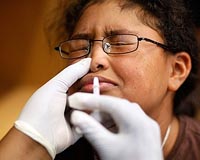| . |  |
. |
Geneva (AFP) June 3, 2010 World Health Organisation chief Margaret Chan on Thursday decided to maintain a pandemic alert nearly a year after she placed the world on maximum readiness for the new swine flu virus. The WHO said following advice from a panel of scientists that although the outbreak had declined, cases of A(H1N1) influenza were expected to continue in the coming weeks mainly during the southern hemisphere's flu season. "Committee members stressed that it remains critical for countries to continue to maintain vigilance concerning the pandemic," the agency said in a statement. The announcement followed a teleconference on Tuesday of the committee, which comprises 15 scientists headed by Australian infectious diseases expert John Mackenzie and advises Chan. "Following the advice of the Emergency Committee, the Director-General determined that while the period of most intense pandemic activity has passed, pandemic disease is expected to continue to occur," the WHO said. It added that the situation would be reassessed by mid July 2010, when full information on the winter influenza season in the south was available. Tropical areas of the Caribbean and South Asia are currently the most active areas for the pandemic, with a "relatively low level of resurgence of cases". However, last year those areas experienced their most intense bouts of swine flu in July, the WHO underlined. In temperate areas of the southern hemisphere, increases in general influenza activity were within common seasonal epidemic levels, while in West Africa the pandemic flu has largely subsided after a peak in February and March, it added. A(H1N1) influenza has killed more than 18,114 people and affected some 214 countries and territories since the virus emerged in Mexico and the United States in April 2009, according to WHO data. The new virus spread swiftly worldwide despite emergency containment, prompting the UN health agency to scale up its alerts and declare a pandemic on June 11, 2009. Fears about the severity of swine flu and a harmful mutation sparked a rush for hundreds of millions of dollars worth of specially-developed vaccines and a flurry of public health precautions. But those concerns fizzled out in the latter stages of 2009, especially in the northern hemisphere. Regular seasonal influenza viruses now incorporate protection against A(H1N1) swine flu and the WHO insists on the merits of flu jabs. "Pandemic or no pandemic, H1N1 will still exist. If there is no pandemic it means that H1N1 is behaving like a seasonal influenza virus but it is still there," spokesman Gregory Haertl said. "Therefore vaccination against H1N1 is still important," he added, especially for pregnant women, the young and those weakened by other ailments. The WHO has responded to criticism of the international alert by setting up an independent committee of experts this year to review the handling of the swine flu pandemic. The review panel is due to report its findings by the beginning of next year.
Share This Article With Planet Earth
Related Links Epidemics on Earth - Bird Flu, HIV/AIDS, Ebola
 Flu Doesn't Die Out, It Hides Out
Flu Doesn't Die Out, It Hides OutAnn Arbor, MI (SPX) Jun 03, 2010 Every autumn, as predictably as falling leaves, flu season descends upon us. Every spring, just as predictably, the season comes to a close. This cyclical pattern, common in temperate regions, is well known, but the driving forces behind it have been in question. Do existing strains die off each spring, only to be replaced each fall by new founding strains from other parts of the world, or ... read more |
|
| The content herein, unless otherwise known to be public domain, are Copyright 1995-2010 - SpaceDaily. AFP and UPI Wire Stories are copyright Agence France-Presse and United Press International. ESA Portal Reports are copyright European Space Agency. All NASA sourced material is public domain. Additional copyrights may apply in whole or part to other bona fide parties. Advertising does not imply endorsement,agreement or approval of any opinions, statements or information provided by SpaceDaily on any Web page published or hosted by SpaceDaily. Privacy Statement |